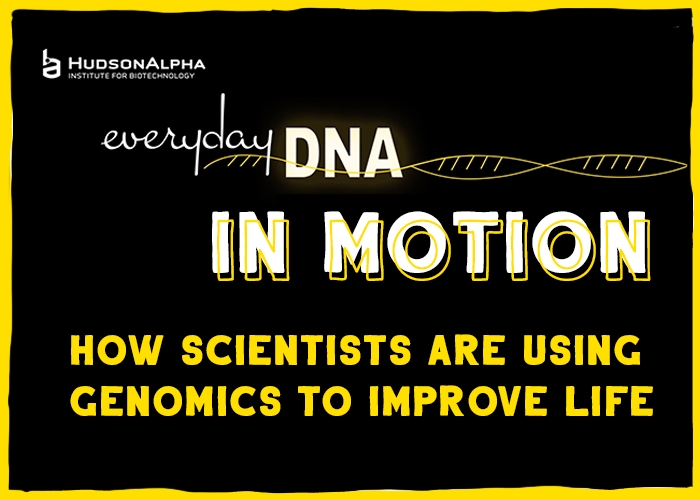Discovery could lead to new, targeted therapy for triple negative breast cancer
Huntsville, Ala. — Researchers at the HudsonAlpha Institute for Biotechnology, a nonprofit genetics and genomics research institute in Huntsville, Ala., and collaborators from the University of Alabama (UAB) and the Huntsman Cancer Institute have discovered a new gene signature regulated by a specific transcription factor – proteins that switch genes on and off – that is involved in regulating processes active in triple negative breast cancer. Results from the study were published in the journal Oncotarget last December.
The research was led by then-graduate assistant Joy Agee McDaniel, PhD, who recently joined The University of Texas MD Anderson Cancer Center as a postdoctoral fellow. McDaniel lost her best friend, who was only 24 years old, to breast cancer, and the loss motivated her to pursue graduate work at HudsonAlpha in breast cancer research, specifically triple negative breast cancer.
“My research is not only important to me because of my personal connection to breast cancer,” McDaniel said, “but also to men and women around the world because learning more about the basic biology of triple negative breast cancer will put us one step closer to developing better therapies and saving lives.”
In her time as a graduate assistant trainee in the Myers Lab at HudsonAlpha, McDaniel took a significant step toward meeting her goal. She and her colleagues discovered a new gene signature regulated by the transcription factor STAT3.
“What we found,” McDaniel said, “was that therapies that target STAT3 could prevent metastasis in triple negative breast cancer.” In metastasis, cancer cells break away from where they first formed, travel through the blood or lymph system, and form new tumors in other parts of the body.
Triple negative is one of the least treatable and most aggressive forms of breast cancer because it does not respond to hormonal therapies and is usually diagnosed at a later stage. McDaniel points out that while African American women have lower incidence of breast cancer diagnosis compared to white women, African American women have disproportionately lower survival rates from breast cancer.
One out of every three breast cancer diagnoses in African American women is triple negative,” McDaniel said. “I want to help more women survive this devastating form of breast cancer.”
This research could lead to a new targeted therapy for triple negative breast cancer, which currently has no therapies tailored to treat its specific genetic makeup.
“We’re excited about the discoveries in triple negative breast cancer that Joy McDaniel made with our collaborators in her time here as a graduate assistant,” said Richard Myers, PhD, HudsonAlpha president and science director. “We look forward to continuing our breast cancer research here at HudsonAlpha and contributing to the understanding of this difficult form of breast cancer.”
Learn more about McDaniel’s research in the following video where she discusses the need to identify transcriptional regulators.
The TNBC work was supported by NSF-GRFP, NIH-MIGMS 5T32GM008361-21, the State of Alabama, HudsonAlpha’s Tie the Ribbons Fund for Breast and Ovarian Cancer Research, and the Prevent Cancer Foundation.
About HudsonAlpha: HudsonAlpha Institute for Biotechnology is a nonprofit institute dedicated to innovating in the field of genomic technology and sciences across a spectrum of biological challenges. Opened in 2008, its mission is four-fold: sparking scientific discoveries that can impact human health and well-being; bringing genomic medicine into clinical care; fostering life sciences entrepreneurship and business growth; and encouraging the creation of a genomics-literate workforce and society. The HudsonAlpha biotechnology campus consists of 152 acres nestled within Cummings Research Park, the nation’s second largest research park. Designed to be a hothouse of biotech economic development, HudsonAlpha’s state-of-the-art facilities co-locate nonprofit scientific researchers with entrepreneurs and educators. The relationships formed on the HudsonAlpha campus encourage collaborations that produce advances in medicine and agriculture. Under the leadership of Dr. Richard M. Myers, a key collaborator on the Human Genome Project, HudsonAlpha has become a national and international leader in genetics and genomics research and biotech education, and includes more than 30 diverse biotech companies on campus. To learn more about HudsonAlpha, visit: http://hudsonalpha.org/
HudsonAlpha Media Contact:
Margetta Thomas
256-327-0425
mthomas@hudsonalpha.org
MD Anderson Media Contact:
Julie A. Penne
Associate Director, Public Relations
The University of Texas MD Anderson Cancer Center
713.792.0662
jpenne@mdanderson.org


